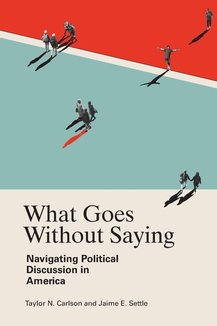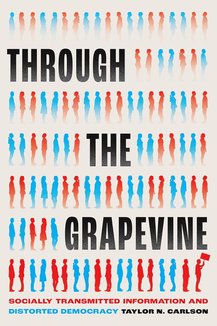Recommended Books

What Goes Without Saying
Author:
Taylor N. Carlson
ISBN 13:
978-1108927444
Why are political conversations uncomfortable for so many people? The current literature focuses on the structure of people's discussion networks and the frequency with which they talk about politics, but not the dynamics of the conversations themselves. In What Goes Without Saying, Taylor N. Carlson and Jaime E. Settle investigate how Americans navigate these discussions in their daily lives, with particular attention to the decision-making process around when and how to broach politics. The authors use a multi-methods approach to unpack what they call the 4D Framework of political conversation: identifying the ways that people detect others' views, decide whether to talk, discuss their opinions honestly―or not, and determine whether they will repeat the experience in the future. In developing a framework for studying and explaining political discussion as a social process, What Goes Without Saying will set the agenda for research in political science, psychology, communication, and sociology for decades to come.

Through the Grapevine: Socially Transmitted Information and Distorted Democracy (Chicago Studies in American Politics)
Author:
Taylor N. Carlson
ISBN 13:
978-0226834177
An enlightening examination of what it means when Americans rely on family and friends to stay on top of politics. Accurate information is at the heart of democratic functioning. For decades, researchers interested in how information is disseminated have focused on mass media, but the reality is that many Americans today do not learn about politics from direct engagement with the news. Rather, about one-third of Americans learn chiefly from information shared by their peers in conversation or on social media. How does this socially transmitted information differ from that communicated by traditional media? What are the consequences for political attitudes and behavior? Drawing on evidence from experiments, surveys, and social media, Taylor N. Carlson finds that, as information flows first from the media then person to person, it becomes sparse, more biased, less accurate, and more mobilizing. The result is what Carlson calls distorted democracy . Although socially transmitted information does not necessarily render democracy dysfunctional, Through the Grapevine shows how it contributes to a public that is at once underinformed, polarized, and engaged.

Sorry I'm Late, I Didn't Want to Come: One Introvert's Year of Saying Yes
Author:
Jessica Pan
ISBN 13:
978-1449499235
An introvert spends a year trying to live like an extrovert with hilarious results and advice for readers along the way. What would happen if a shy introvert lived like a gregarious extrovert for one year? If she knowingly and willingly put herself in perilous social situations that she’d normally avoid at all costs? Writer Jessica Pan intends to find out. With the help of various extrovert mentors, Jessica sets up a series of personal challenges (talk to strangers, perform stand-up comedy, host a dinner party, travel alone, make friends on the road, and much, much worse) to explore whether living like an extrovert can teach her lessons that might improve the quality of her life. Chronicling the author’s hilarious and painful year of misadventures, this book explores what happens when one introvert fights her natural tendencies, takes the plunge, and tries (and sometimes fails) to be a little bit braver.